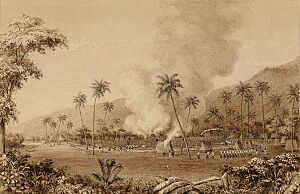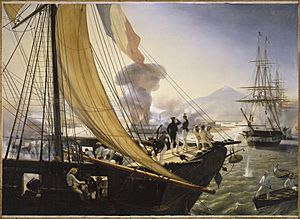Punitive expedition facts for kids
A punitive expedition is a military journey. It's when a country or group sends its military to another place to punish a political group or people outside its own borders. This usually happens because the group being punished is seen as having done something wrong or disobedient. It can be a way to get revenge, correct a problem, or put strong diplomatic pressure on another state without officially declaring war.
In the 1800s, these expeditions were often used as an excuse for colonial powers to take over new lands, change governments, or force other countries to follow their rules.
A legal expert named Stowell said in 1921 that if a country is too weak or unwilling to follow international rules, another country that has been wronged might need to go into that territory. This is to punish the people who broke the rules and threatened its safety.
Contents
What is a Punitive Expedition?
A punitive expedition is a military action. Its main goal is to punish a group or country for something they did. This might be a response to an attack, a violation of agreements, or other actions seen as harmful. These missions are often quick and focused. They aim to show power and prevent future problems.
Famous Historical Examples
Throughout history, many groups and empires have used punitive expeditions. Here are some examples:
Ancient and Medieval Expeditions
- In the 5th century BC, the Achaemenid Empire (a large Persian empire) launched military campaigns against Ancient Greece. They wanted to punish certain Greek city-states for helping in a rebellion called the Ionian Revolt.
- In the early 1st century AD, the Roman general Germanicus led expeditions against Germanic tribes. This was a punishment for the Roman Legions that were destroyed in the Battle of Teutoburg Forest.
- In 518 AD, Negus Kaleb of Axum sent a punitive expedition against the Himyarite Kingdom. This was because the Himyarite Jews were persecuting Christians.
- In the 13th century, Genghis Khan, who founded the Mongol Empire, often used punitive expeditions. He used them as an excuse or to stop rebellions. Examples include his invasion of Khwarazim and his campaigns against the Western Xia kingdom.
- Also in the 13th century, Kublai Khan (Genghis Khan's grandson) sent people to the Singhasari kingdom of Java. He demanded they pay tribute. The ruler, Kertanagara, refused and even tattooed a Chinese messenger's face. Kublai Khan sent a punitive expedition in 1293.
Early Modern Expeditions
- In 1599, the Spanish explorer Juan de Oñate ordered his nephew to lead a punitive expedition against the Keres natives of Acoma Pueblo. The Spanish fought a three-day battle with the Keres. About 800 people died.
- During the Eighty Years' War, Spanish Admiral Luis Fajardo raided the Caribbean in 1605. He attacked and killed smugglers and Dutch privateers who were illegally taking salt from Araya.
- During the First Anglo-Powhatan War (1610–1614), Lord de la Warr led a campaign to subdue the Powhatan people. This was after they killed the colony’s council president, John Ratcliffe.
- In 1614, Ottomans led by Damat Halil Pasha successfully punished an insurgent (rebel) named Sefer Dā'yl in Tripoli.
- In 1784, Denmark and its local allies carried out a short expedition against the Anlo Ewe in the Sagbadre War.
19th Century Expeditions
- From 1838 to 1842, ships from the United States Exploring Expedition carried out three punitive expeditions against Pacific islanders.
- The First Opium War (1839–1842); led to several ports opening and Hong Kong being given to Great Britain.
- The 1842 Ivory Coast Expedition was led by Matthew C. Perry. It was against the Bereby people of West Africa after two attacks on American merchant ships.
- The Battle of Kabul in 1842 was fought by the British against the Afghans. This followed a terrible British retreat from Kabul where many people died.
- The French Campaign against Korea in 1866 was a response to Korea executing French priests.
- The 1867 Formosa Expedition was a failed attempt by the United States in Taiwan.
- The 1868 British Expedition to Abyssinia (Ethiopia) was a rescue mission and punitive expedition. Emperor Tewodros II of Ethiopia had imprisoned British missionaries and government representatives. The British commander, General Sir Robert Napier, won all battles, captured the capital, and rescued the hostages.
- The United States expedition to Korea in 1871 was in response to the General Sherman incident. A U.S. merchant ship was burned as it entered Pyongyang.
- The 1874 Japanese expedition against Formosa was also a punitive action.
- The Benin Expedition of 1897 was a British punitive action. It led to the British taking over the Kingdom of Benin. The New York Times reported that a "punitive expedition" would be formed to "punish the murderers of the Benin City expedition."
- The Eight-Nation Alliance's invasion of China in 1900 was a response to the Siege of the International Legations during the Boxer Rebellion.
- The British expedition to Tibet from 1903 to 1904 was a temporary invasion by British Indian forces. Its goal was to establish diplomatic relations and settle a border dispute.
20th and 21st Century Expeditions
- During World War I, the battle of Asiago was called Strafexpedition (punitive expedition) by the Germans. It was an unsuccessful attack by Austria-Hungary against Italy.
- The Pancho Villa Expedition from 1916 to 1917 was led by General John J. Pershing. It was a response to Pancho Villa's attack into the United States.
- The 1920 Iraqi Revolt against the British Mandate of Mesopotamia was suppressed.
- During the 1965 Indo-Pakistani War, India's attack into Pakistan was seen as a punitive expedition. This was because Pakistan had attacked into Indian Kashmir.
- The 1979 invasion of Vietnam by China was described by Deng Xiaoping as a punishment. This was because Vietnam had invaded Cambodia.
- In 1988, the United States Navy destroyed half of the Islamic Republic of Iran Navy's ships during Operation Praying Mantis. This was punishment for damaging the USS Samuel B. Roberts by mining international waters.
- The 2016 India–Pakistan military confrontation began with alleged punitive "surgical strikes" by India. These strikes were a punishment for Pakistan not stopping terrorist groups like Lashkar-e-Taiba and Jaish-e-Mohammad, which India blamed for the Uri attack.
- The 2022 Russian Invasion of Ukraine has also been described as a punitive expedition.
See also
 | Bessie Coleman |
 | Spann Watson |
 | Jill E. Brown |
 | Sherman W. White |




